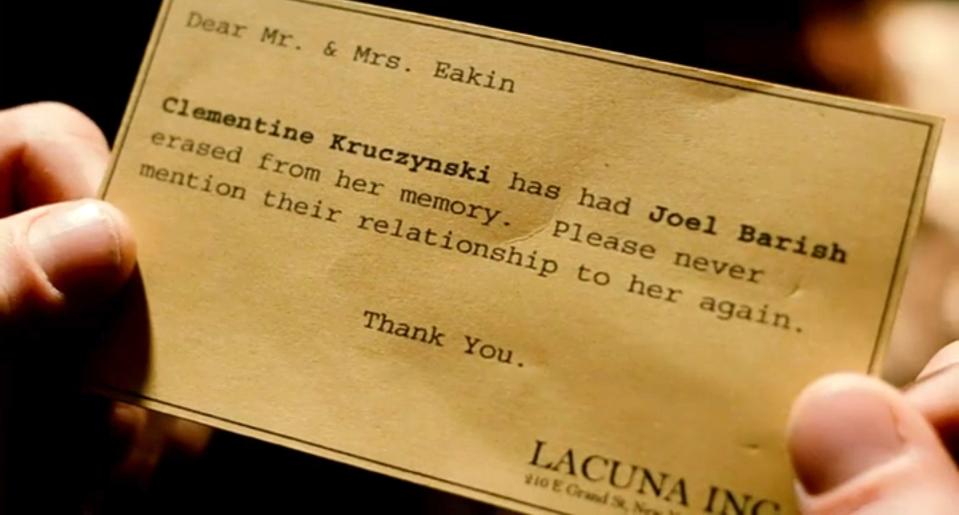Ariana Grande's newest muse 'Eternal Sunshine of the Spotless Mind' is a tragic film disguised as romance

Ariana Grande announced on Wednesday that her new album is called "Eternal Sunshine."
The title was inspired by Michel Gondry's 2004 film "Eternal Sunshine of the Spotless Mind."
Despite the optimistic title, it's a tragic story about doomed repetition. Spoilers ahead.
Ariana Grande confirmed fan suspicions on Wednesday when she announced the title of her seventh album: "Eternal Sunshine."
Theories had been circulating for days, thanks to coordinates conspicuously placed in the music video for "Yes, And?" — Grande's new song and the album's lead single.
The coordinates led to Montauk, New York, a key location in the 2004 sci-fi film "Eternal Sunshine of the Spotless Mind." (She also liked several social media posts, confirming the title's inspiration.)
Written by Charlie Kaufman and directed by Michel Gondry, the movie follows the meek, brooding Joel Barish (played by Jim Carrey, Grande's favorite actor) and the brash, spontaneous Clementine Kruczynski (Kate Winslet) as they fall in and out of love.
The story is mostly told through Joel's eyes — specifically through his memories of Clementine, as he goes through a medical procedure to have them erased. He only opts for this to get even with his ex-girlfriend, who'd already erased her memories of him.
As the lead technician explains, the procedure is technically "brain damage." But the promise of a "spotless mind," free of anger and heartache, is too enticing.
Now's the time to click away if you'd like to avoid spoilers.

As Joel's memories of Clementine are methodically unraveled, he realizes his mistake — the happy memories are torn away, too — but he can't stop the process. He relives their relationship in all its beautiful, infuriating, ruinous glory; he falls in love with Clementine all over again. After he wakes up, she's a stranger. They meet again by happenstance. Neither can remember their history, but they choose to be together all over again.
The disjointed narrative is surreal and thought-provoking, at turns tender and disquieting. It's widely regarded as a cinematic masterpiece. It's also my standard answer to the first-date question, "What's your favorite movie?"
My very first viewing of "Eternal Sunshine of the Spotless Mind" occurred in 2010, when I was 14. I'd go on to reblog many photos of Joel and Clementine on Tumblr, as well as quotes like "I can't remember anything without you" and "I wish I knew you when I was a kid."
Like many teenagers and hopeless romantics, I misunderstood these characters as star-crossed lovers — victims of impulse and timing who would find each other in every lifetime.
I haven't heard Grande's take on "Eternal Sunshine" yet, but based on the album promo, I fear she may have fallen into the same trap. She has been using the infinity symbol, paired with the sun, heart, and bubble emojis, in her latest Instagram captions. The lead single is a boppy directive to follow your bliss, haters be damned.
"Everybody's tired and healing from somebody / Or something we don't see just right," she sings in the first verse.
The healing process is a common theme in Grande's discography, and if "Yes, And?" is any indication, it'll reappear throughout "Eternal Sunshine."
Of course, healing is impossible without memory, self-awareness, and a capacity to learn from the past — what I recognize now as the whole point of "Eternal Sunshine of the Spotless Mind." As I've gotten older, I've grown to understand the movie's final scene as deeply tragic. Joel and Clementine are fundamentally incompatible. They're doomed to repeat their mistakes, to break each other's hearts, and to refeel the pain they tried to erase.
In fact, the movie's original script makes this explicit.
In Kaufman's first draft, the story ends with an older version of Clementine. She's had her memories erased over and over again for 50 years, "all of them involving Joel Barish."
While the actual ending is more subtle and ambiguous, the movie doesn't hide its core message. The spotless mind's biggest champion is Mary Svevo (Kirsten Dunst), a receptionist at the memory-erasure company Lacuna, who truly believes in its mission. She is convinced the procedure gives people a blank slate, a second chance: "You look at a baby and it's so pure and so free and so clean," she says. "Adults are like, this mess of sadness and phobias. Howard makes it all go away."

Mary secretly loves Dr. Howard Mierzwiak (Tom Wilkinson), the lead technician at Lacuna. But she's been in love with him before. She just doesn't remember.
It's revealed that Howard pressured Mary into having her memory erased after his wife discovered their affair; she falls in love with him again, and it blows up again. By the movie's end, Mary is staunchly against the procedure, finally awake to its risks and murky ethics.
Mary's heartbreak foreshadows the loop that Joel and Clementine will fall into. The "eternal sunshine of the spotless mind" is, in short, a lie. The title is meant to be ironic. None of the characters who have their memories wiped are happy or better off because they're emotionally stunted and unable to move on.
Perhaps Grande's album will also grapple with these themes: toxic cycles, willful ignorance, the harsh realities of adulthood. But chopping off the second piece of the movie's title doesn't make for a promising start.
As a solitary phrase, "Eternal Sunshine" evokes optimism and light — the sort of pure, free, clean baby brain Mary reveres before she learns the truth. Unfortunately, adults know that sadness and phobias are a natural part of life. The good stuff can't exist without them.
Read the original article on Business Insider

 Yahoo News
Yahoo News 
